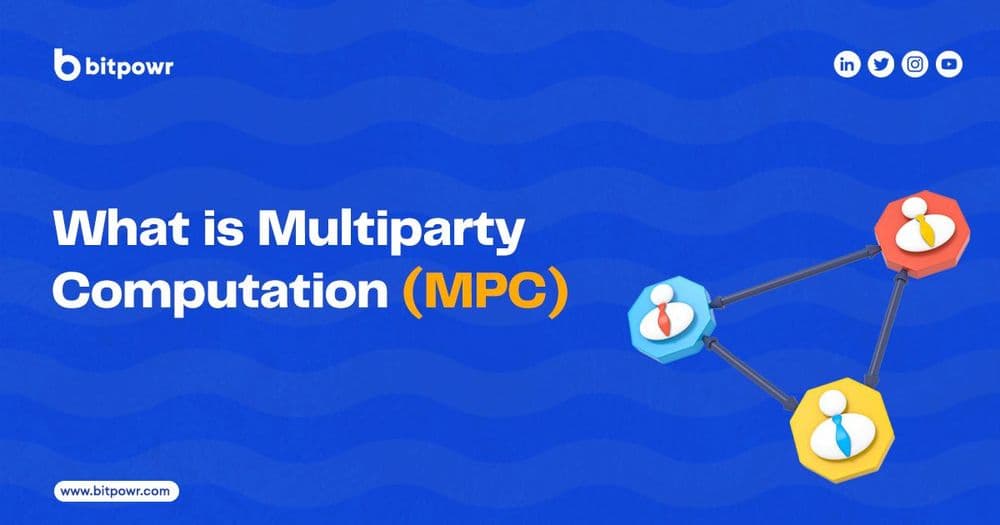What is Multiparty Computation (MPC)
Wallets are to digital assets what air is to life; the former supports the latter. A digital asset lives in a wallet so to speak, they help to store and manage our cryptocurrencies securely.
One of the most secure wallets currently available is the Multiparty Computation Wallet.
What exactly is Multiparty Computation?
Multiparty Computation (MPC) is a cryptography technology that enables a group of different data owners to jointly compute a function of their private inputs, without requiring them to share their private data with one another or any other party. For a digital asset custody wallet like bitpowr, the “different data owners’ ’ are the multiple parties that hold a share of a private key and use those key shares to provide their part of a multiparty approval of a transaction. Their “joint computation” generates a single digital signature to release digital assets for transfer to a third party.
A brief history of Multiparty Computation
The concept of multiparty computing emerged in 1970. Historically it has mostly been used to hide information. Modern cryptography uses math and computation to encrypt and decrypt messages or to guarantee the authenticity of the information. Today, this technology is currently found in a variety of smartphones and computer chips.
The idea to create multiparty comes from the need for a technology in which security models could be enabled where a variety of parts are required to access the system. Each of the parts allows the system to be unlocked, depending on the level of access. It was not until 1990 that this concept came to life thanks to David Chaum, a pioneer in the cryptographic world who presented an elaborate paper on this protocol. The paper was called “Unconditionally Secure Multiparty Protocols’'.
How does the Multiparty Computation technology work?
The operation of an MPC Wallet is divided into three essential parts: key generation, address generation, and access to funds. In the following paragraphs, we will see what each one consists of in detail.
1. Generate Key
This is the mechanism with which the wallet generates private and public keys and it also creates the registration of the private and public keys for the wallet’s locking mechanisms.
This is how the unlocking devices generate a pair of public and private keys. They are then combined with those of the other devices to generate the MPC wallet’s private and public keys. This scheme attempts to distribute wallet control in a simple and similar manner to prevent a hacker from taking control of the wallet.
It should be noted that these keys are generated by a protocol defined by a very simple mathematical formula: nF(d1, d2, d3) = max(d1, d2, d3).
You may be thinking that this formula is too complicated and difficult to understand, however, it simply means that each participant has in its possession private data that would be from d1, d2…dN. Thanks to this private data, by using a public function called F we can calculate how much the private data is worth as well as enable the use of the wallet. For this, we use the cryptographic signature algorithm which can be either ECDSA, EdDSA, Schnorr, or any other compatible one. If we add all these private data we obtain as a result a cryptographic reason that provides access to the wallet.
2. Generate Address
In this case, MPC wallets are very similar to the ones we already know, like Multisig wallets. Either party can request to generate a public key. The generated address can then be used to receive funds.
This is possible thanks to asymmetric cryptography. The security of sharing the public key is due to the complexity of performing the process opposite to the generation of the public key. It is, therefore, safe to generate public keys for each member.
As for the private key, the goal of the MPC wallet is to keep the private key divided among several devices to avoid easy balance control.
3. Access to funds
In order to access the funds, the conditions determined during the creation of the MPC wallet must be fulfilled. If four devices with private data were entered during generation, these four devices must be present to access the wallet.
To protect these devices, cryptographic systems, security modules such as HSM or other security features are often used. In fact, only originally paired devices will be able to access the MPC wallet and the funds.
Use cases MPC, including genetic testing and auctions.
As the necessity for information security increases along with digitalization, MPC is increasingly used to protect sensitive data by acting as a digital non-disclosure agreement restricting who can access what data. These are a few examples of its use case.
- MPC can be used in genetic testing to allow individuals to evaluate their own genetic profile without unintentionally disclosing to authorities or insurers how quickly they metabolize caffeine or how likely it is that they will develop diabetes.
- MPC can be used in sensitive research to safely gather and analyze data such as financial and medical information—without requiring people to divulge private information to a third party.
- MPC can be used in sealed-bid auctions to guarantee that each bid entered concurrently remains totally secret.
Future Expectations for secure MPC.
MPC has rapidly established itself as the industry norm for protecting digital assets. Major financial organizations like Revolut, the biggest neobank in Europe, are switching to MPC. Other applications of MPC include off-exchange matching, privacy-preserving statistics, and cloud private key management.
In the near future, multi-party computation will also have a big impact on things like Data-as-a-Service solutions, databases, cryptographic data security, etc.
The Bitpowr MPC-based wallet helps your business scale much more rapidly and easily due to its blockchain agnostic nature and adaptability to unforeseen developments like blockchain forks, larger client bases, and technological advancements.
Do you have any questions or inquiries on how to get MPC wallets for your business? Talk to us




